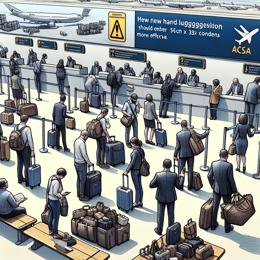Picture: for illustration purposes
Cape Town International Airport Runway Closure Causes Flight Chaos
A palpable aviation disruption hit Cape Town International Airport on Thursday afternoon after a substantial hydraulic fluid leak from an aircraft with a technical flaw forced the closure of the main runway. The unforeseen situation left passengers stranded as arrivals and departures were either delayed or diverted, stirring up a tumultuous scene at one of Africa's largest airports.
According to Airports Company South Africa (Acsa), the primary landing strip was declared off-limits for safety reasons shortly past 2 p.m. While the organisation assured a swift reopening of the runway, it admitted later in the evening, around 9 p.m., to the runway remaining unapproachable.
In their post-incident communication, Acsa explained, "The main runway was closed just after 2pm this afternoon. However, the secondary runway has remained available to small gauge aircraft leading to some operations continuing with impacted schedules."
The offending aircraft was timely evacuated from the main strip, followed by a detailed inspection and diligent clean-up operations to ensure the safety of all airport users—the primary responsibility and biggest priority for Acsa.
Several airlines experienced blockages and delays, prompting air travel users to hurl their frustrations and anxieties via social media. Prominent airlines like British Airways, FlySafair, United Airlines, Ethiopian Airlines, and Emirates emerged as the tip of the iceberg of the ensuing chaos.
A constant stream of updates was launched by respective airlines to ensure customer awareness about the situation. Nevertheless, with several passengers kept in the dark and their flights postponed indefinitely or until the following day, frustrations understandably flared.
Cape Town International Airport serves as a vital link for both domestic and international travel, and this incident underlines the importance of constant vigilance to maintain safety and efficiency of operations in the bustling air transport industry.










